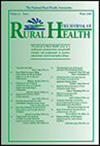Impact of rural-urban residence and deprivation on care pathways for depression disorders among adults in the UK
Abstract
Purpose
To investigate how rurality shapes individual care pathways and health outcomes for depression and to investigate the sociodemographic and economic relationships with urban-rural variations.
Methods
A retrospective cohort study using routinely collected data from adult patients diagnosed for depression and registered at a general practice in Lincolnshire in the UK. Access and time to access from the onset of depression symptoms to the following care pathway states were described (ie, access to a depression screening tool, confirmed diagnosis, access to treatment and outcomes). Multistate survival analyses were conducted to investigate the effect of the patient's living environment (rural/urban, index of multiple deprivation) on progression through their care pathway for depression.
Findings
Overall, 1,111 patients with depression were included. While access to depression services were lower for patients living in rural areas, they were more likely to experience positive depression outcomes, and more quickly, compared to their urban counterparts. Controlled depression and relapse rates were, respectively, 29% lower and 31% higher among urban residents. The level of deprivation was found to have a limited effect on care access, as well as on depression outcomes.
Conclusion
While accessing care services remains a challenge in rural areas, our study highlights the potential benefits of the rural context in improving depression outcomes and lowering relapse risk. Area-based deprivation had minimal impact on both care access and depression outcomes. Future mental health programs must tailor their strategies to the unique challenges of urban and rural environments to facilitate more effective interventions.


 求助内容:
求助内容: 应助结果提醒方式:
应助结果提醒方式:


